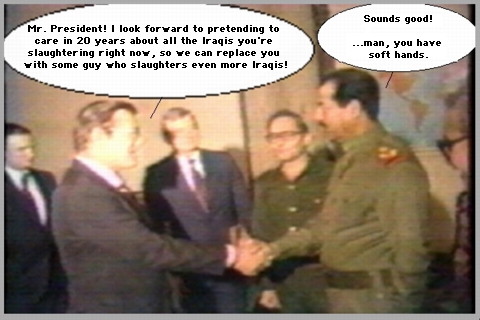
There's no question Iraqi Prime Minister Nouri al-Maliki has recently been giving the White House and John McCain heartburn. On Saturday in an interview with Der Spiegel he essentially endorsed Obama's plan to withdraw U.S. troops from Iraq. Then did it again today, right after speaking with Obama in Baghdad:
After talks with Democratic presidential candidate Barack Obama on Monday, Iraqi Prime Minister Nouri al Maliki reaffirmed that Iraq wants U.S. combat troops to withdraw from Iraq by the end of 2010, a few months later than Obama had proposed.
So it's worth looking back at the Bush administration's private views of Maliki, as stated by Donald Rumsfeld back in 2006.
For the recent New York Time story on the close government ties of TV military analysts, the paper pried loose tons of internal Pentagon records never meant to see the light of day. Buried in the pile was a recording of Rumsfeld having lunch with many of the Pentagon's analysts in December, 2006 just before he was replaced by Robert Gates. (The large .wav file is available here.)
One section of the recording goes like this:
UNIDENTIFIED ANALYST #1: This is really off the record, but do you think that this government can survive -- the unity government -- or they're eventually gonna have to go to an authoritarian one like came out of [South] Korea, Syngman Rhee, was really an authoritarian leader. The eleven years I was supporting commander in Korea, the president was an Army major general in civilian clothes and they had their highest growth rates and did the '88 Olympics and they finally handed it over. The real question is, and we all hope the unity government [inaudible], but it's very difficult.
RUMSFELD: It is very difficult. You look at it and there isn't anyone smart enough to know the answer to your question.
UNIDENTIFIED ANALYST #1: I think the answer's they can't, but how you do get that right person?
RUMSFELD: I mean, Allawi had steel up his backside.
UNIDENTIFIED ANALYST #2: Fallujah.
RUMSFELD: And he wasn't well liked and wasn't perfect. He'd leave the country for long periods and stuff. He was not as attentive as he needed to be, it strikes me. But good lord, in terms of dealing with him, he was terrific. He could make a decision and he would kick some fanny to get it implemented, and you felt good about it. The fellow who proceeded Maliki [Ibrahim al-Jaafari] was like a windsock. You know, he was the last guy he talked to, and we're still off the record.
Q: We heard that windsock terminology over there from somebody else.
RUMSFELD: Oh man, he was something. Yes, he's a hell of a -- a very pleasant guy, but good grief, the last guy he talked to. This fella [Maliki] is better than the one before, but he's not Syngman Rhee.
For anyone familiar with Ayad Allawi and Syngman Rhee, the casual admiration Rumsfeld expresses for them is like a punch in the stomach. The hands of both Allawi and Rhee are covered with the blood of their countrymen.
Allawi was a member of Saddam Hussein's Baathist Party during the sixties and seventies. Seymour Hersh quotes an American intelligence official as saying "Allawi helped Saddam get to power"; Hersh also reports that a high level Middle East diplomat told him that Allawi was part of a Baathist Party hit squad that murdered dissenters in Europe. (After a falling out with Saddam in the mid-seventies, Allawi lived in England and ended up channeling false information about Iraq's purported WMD and Al-Qaeda ties to the media.)
But that may merely have been the prelude. The Bush administration was able to briefly install Allawi as Iraq's Prime Minster in 2004. Soon afterward, Jon Lee Anderson of the New Yorker provided convincing evidence that, just before taking office, Allawi had personally shot seven Iraqi prisoners.
Yet as bad as Allawi was, the South Korean dictator Syngman Rhee was far worse. According to recent reporting by AP, Rhee, who took power in 1948, supervised the slaughter of over 100,000 South Koreans in the space of a few weeks.
Indeed, Allawi and Rhee seem almost indistinguishable from Saddam Hussein. But then, Rumsfeld never had any real problems with him either.

[The secret dictator handshake]
BONUS: Allawi's successor and Maliki's predecessor as prime minster was Ibrahim al-Jaafari. Jaafari is the one whom Rumsfeld refers to as a "windsock." In what must have come as quite a surprise to the Bush administration, Jaafari was a fervent admirer of Noam Chomsky.
originally posted at the Tiny Revolution